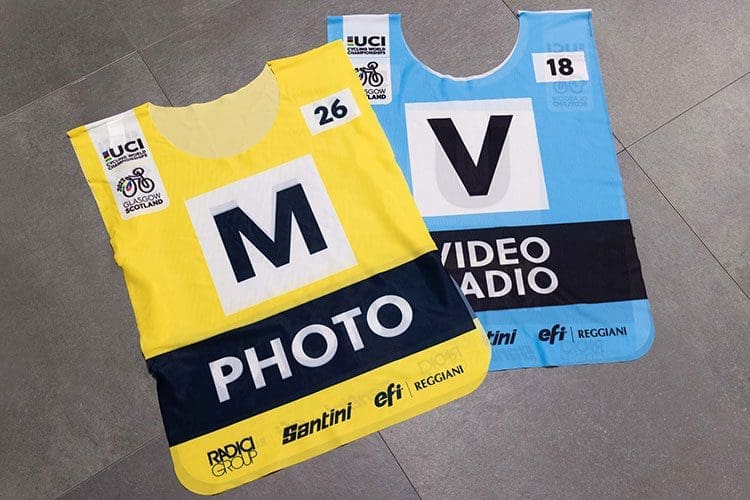For the 2023 UCI Cycling World Championships, the Union Cycliste Internationale chose Santini to make the bibs from totally recyclable materials, reflecting its ever-growing commitment to sustainability. The UCI’s historic partner brought together a pool of companies, all in the Bergamo area (Italy): RadiciGroup, Sitip, EFI Reggiani and Acerbis.
In 2022, the Union Cycliste Internationale released the UCI Climate Action Charter, which lays out an action plan to advance the environmental sustainability of the sport with a specific principle to reduce waste and accelerate the transition to a circular economy. This year, the UCI Cycling World Championships, which will be held from 3 to 13 August, are bringing together most of the cycling disciplines in a single location: Glasgow and across Scotland. To mark the occasion, the UCI turned to its Official Partner, Santini, to make the bibs that the staff (judges, volunteers, commissaires etc.) and accredited photographers wear throughout the event.
To fulfil this request, Santini created a supply chain made up of five zero-mile companies, all located in the Province of Bergamo: RadiciGroup, Sitip, EFITM Reggiani and Acerbis.

The bibs for the 2023 UCI Cycling World Championships in Glasgow and across Scotland are “eco-designed”, which means they are specifically created to have a second life after use. Once the event is over, the bibs could be collected and sent to RadiciGroup and transformed into new material, to be then processed by Acerbis to create X-Elite handguards for mountain bikes. This project is a concrete example of the circular economy at work, allowing 100% of the materials used to be recovered.
The production cycle

To optimise the production cycle of the bibs for the 2023 UCI Cycling World Championships, the products must be eco-friendly from the very first phase. The fabrics were therefore made from Italian nylon yarn produced by RadiciGroup. The impressive properties of the yarn guarantees that the resulting material is comfortable, high-performance, soft and luxurious: ideal for technical sportswear. The choice of nylon – an infinitely recyclable thermoplastic material – is strongly intertwined with UCI’s sustainability goals for “limited-use” garments: RadiciGroup was able to channel its know-how and expertise in the field of chemistry to create “circular” bibs, working alongside the other partners. As the innovative yarn selected by RadiciGroup allows for easy and high-quality printing, the fabric is also highly customisable, because sustainability does not mean sacrificing design, aesthetics or functionality.
The yarn is then provided to Sitip to create the “ARAS NG” warp-knitted fabric (95 g/100 m2): a totally recyclable single-fibre material made from 100% polyamide.
The resulting fabric is the first nylon of its kind, designed to meet the transfer printing needs of the third project partner, EFI Reggiani, as well as the recyclability standards requested by RadiciGroup.
The choice of fabric was born from extensive applied research, in which EFI Reggiani tested a wide range of fabrics to find the best colour results and the best resistance to rubbing and perspiration, which is vital for the bibs’ intended use. In addition to using the new GOTS-certified EFI Reggiani IRIS Plus water-based inks, EFI Reggiani opted for a printing solution on transfer paper that does not consume water and requires a minimal amount of energy per square metre.
Finally, the white fabric from Sitip and the transfer paper printed by EFI Reggiani arrived at Santini, who were responsible for transferring all the graphics for the 2023 UCI Cycling World Championships bibs from the paper onto the fabric. Santini also took care to assemble the garments using only thread and components made from nylon or chemically similar materials, allowing the bibs to enter the recycling process at the end of their lives without any further processing.
A second life for the bibs
At the end of the 2023 UCI Cycling World Championships in Glasgow and across Scotland, the bibs used over the course of the eleven days could be transformed into new raw materials to be used again within the cycling world. RadiciGroup has already verified that the recycling process is technically feasible at its plants specialising in the regranulation of recovered materials.

The resulting materials can be used by Acerbis to create a finished product: the X-Elite handguards, which are attached to the handlebars of some mountain bikes to protect the riders’ hands and shield the brake levers during falls.
The bibs for the 2023 UCI Cycling World Championships are therefore born from a zero-mile production process, which saw neighbouring companies come together to achieve the common goal of creating a remarkable recyclable product.
For more information: www.santinicycling.com













